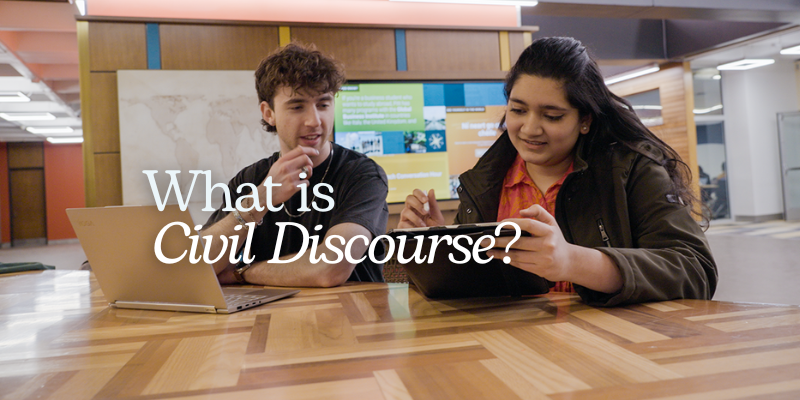What is Civil Discourse? Civil discourse has many definitions.

What is Civil Discourse? We asked administrators, faculty, students, and Chancellor Joan Gabel about what civil discourse means to each of them. The answers are varied but share similar themes of bridging divides, learning to listen, staying humble, and not shying away from hard conversations.
Watch the Real Talk: Across Campus, Across Divides here.
Here’s what they had to say:
Alexander Weaver, Student
To me, civil discourse represents the best way in which we can discuss politics. I think a large issue with how we discuss politics today is that people tend to just assume too much about other people’s lives and about why they may believe what they believe. With civil discourse, we can take an approach in which we try to understand and learn how other people view the same issues that we view, but in their own way. A big part of that is recognizing how their own experiences and identities influence how they view these topics.
When we engage in politics using civil discourse, rather than trying to argue and explain why we’re right, we take it as an opportunity to recognize how might I be wrong and how might my personal viewpoint on this not be the same as someone else, because I didn’t experience the same things in life as that person experienced. It’s about approaching conversations with the goal of learning and understanding how that person experienced their lives and how their life experiences have led them to believe what they believe in.
Callum Mattheson, Chair of the Department of Communication
Civil discourse is everything we say and do in the public sphere that helps us shape the common good. It’s not about private belief—it’s about public action. It’s how we engage each other around issues that affect us all, how we listen, and how we work toward building a shared future.
Samantha Balbier, Executive Director of the Institute of Politics
I think civil discourse means being able to be in community with people who we disagree with. It means that we take a breath and that we actively listen. It means that we come to the table curious and open. And it means that we don’t necessarily come to the table to change anyone’s mind, but to understand their perspective and be able to articulate our own in a way that honors our experience, our ideas, our beliefs, and gives space for others to do the same.
Aqsa Owais, Student
It means showing up with curiosity and respect. It’s not about changing someone’s mind—it’s about understanding where they’re coming from. Civil discourse is about being human with each other, even when we disagree.
Carissa Slotterbock, Dean of the School of Public and International Affairs
For me, it’s about practices that show curiosity and openness. It is about engaging with empathy and in good faith. It means being willing to listen and learn from others, especially when you disagree. It’s about engaging thoughtfully and trying to move forward with deeper understanding.
Joan Gabel, Chancellor
I think civil discourse is fundamentally anchored in respect for the reality that there are multiple points of view. It includes an exchange of ideas and perspectives with the recognition that disagreement can be a good thing—and that the willingness to listen is a key part of that exchange. If we create an environment where there can be healthy disagreement, robust discussion, and active listening, then I think we’ve created civil discourse.
Belkys Torres, Associate Vice Provost for Inclusive Excellence in Education
The term civil discourse—if you ask many of my colleagues—we’re all going to come at the definition from a different point of view and perspective. For me, it means the opportunity to learn by listening and asking questions. I never come into a conversation expecting to walk away having changed someone’s mind, and I don’t expect to walk away having changed my own mind either. But I always come into it with the hope and desire to learn something new. So when I think about civil discourse, I think about how I’m making space to listen, how I’m asking questions to learn something new, and how I’m sharing my own experiences and knowledge in ways that might help someone else learn, too.
Josie Rush, Teaching Consultant
When I think of civil discourse, I think of people coming together to discuss and sometimes try to mitigate or solve social or cultural ills. It’s building on each other’s understanding to come to a new understanding, even if they don’t agree with each other.
Joel Brady, Manager for the Center for Mentoring, and a Part-Time Faculty Member in the Department of Religious Studies
Civil discourse is primarily about civic engagement. I think of civil and civic as relatively synonymous, although some distinctions exist. Folks often conflate civil discourse and civility, which I frequently try to distinguish. It is frequently about people coming together to have discussions across difference and to do so with the idea of participating in a broader society. It doesn’t have to be civil in the sense of civility or politeness; It can be rather heated and still be productive. It’s geared toward a particular aim, which is finding some way to live together and find solutions for doing that.
